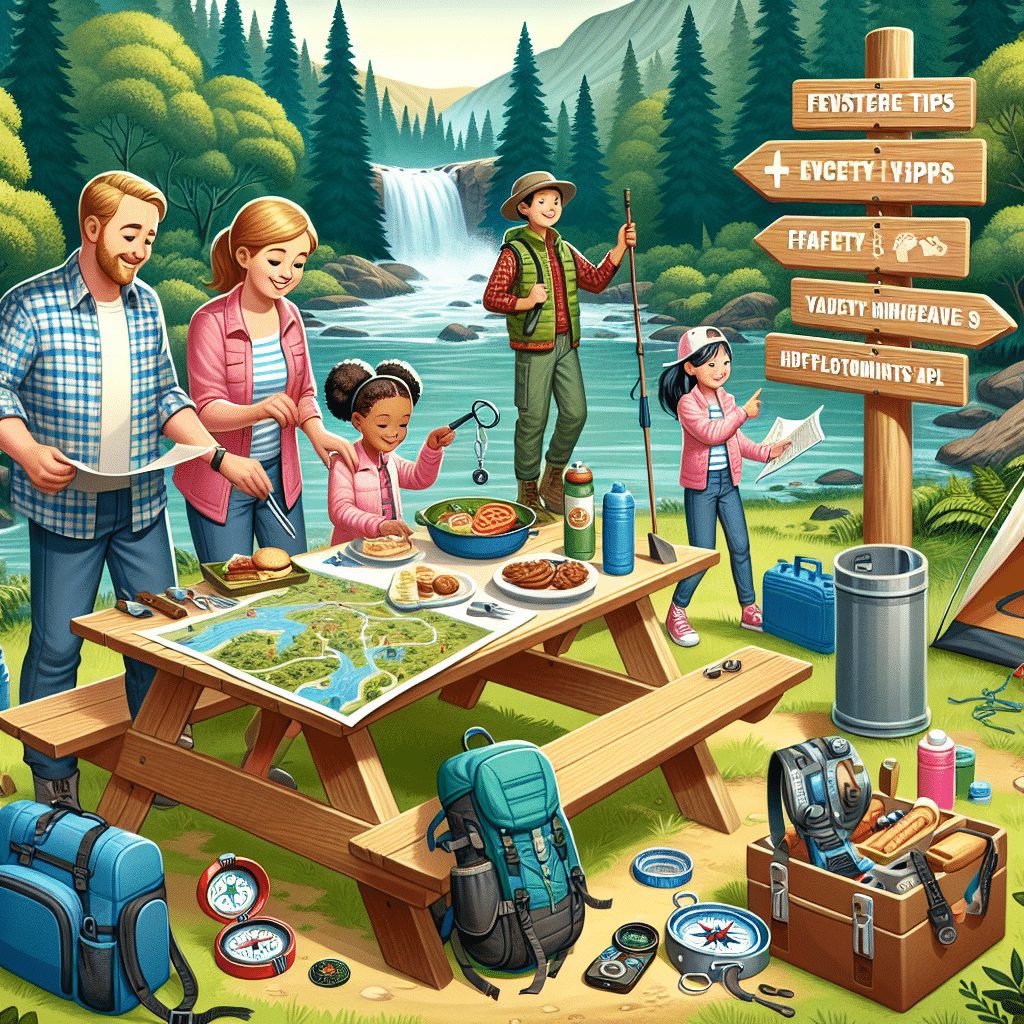There is something magical about gathering around a crackling campfire, roasting marshmallows, and sharing stories under the stars. As parents, we all want to create unforgettable memories for our children, and what better way to do that than by planning a fun-filled camping adventure? In our Family Camping Guide, we have put together a step-by-step plan to help you navigate the world of outdoor exploration with your little ones. From choosing the perfect campground to packing all the essentials, we have you covered. So, grab a cozy blanket and get ready for an epic family escapade that will surely be remembered for years to come.
Review contents
Choosing the Right Campsite
Considerations for a Family-Friendly Campsite
When choosing a campsite for a family trip, it’s essential to consider certain factors that contribute to a family-friendly environment. Look for campsites that offer a range of activities suitable for children, such as playgrounds, swimming areas, nature trails, and organized kids’ programs. Additionally, check for amenities like clean and modern restrooms, showers, and laundry facilities. Consider the proximity of the campsite to attractions and facilities outside the campground, such as grocery stores, hospitals, and restaurants, as these can greatly enhance the convenience and enjoyment of your family camping experience.
Researching Campsite Options
To find the perfect campsite for your family, it’s crucial to conduct thorough research. Utilize online resources and review websites dedicated to camping to gather information and read reviews from fellow campers who have visited certain campsites. Look for reputable camping websites and social media groups where you can ask for recommendations from experienced campers. Be sure to note the specific amenities, activities, and attractions mentioned in the reviews to determine whether they align with your family’s preferences and needs.
Checking Campsite Amenities
Before making your final decision, examine the amenities provided by each campsite you are considering. Look for campsites that offer clean and well-maintained restroom and shower facilities, as well as access to clean drinking water. Look for electrical hookups if you require them, and consider whether the campsite has designated areas for activities such as cooking, picnicking, and campfires. It may also be helpful to inquire about any restrictions or regulations, such as quiet hours or pet policies, to ensure they align with your family’s preferences and needs.
Setting Up Camp
Choosing the Right Tent
When it comes to choosing a tent for your family camping trip, it’s important to consider the size and durability. Opt for a tent that provides enough space to accommodate your entire family comfortably. Look for tents with separate sleeping compartments or dividers that offer privacy and flexibility. Additionally, consider the tent’s material and construction to ensure it can withstand various weather conditions. Look for features such as waterproofing, sturdy zippers, and ample ventilation. It’s also worth considering ease of setup and teardown to minimize stress and maximize enjoyment during the camping experience.
Arranging Sleeping Gear
To ensure a restful night’s sleep, it’s important to arrange your sleeping gear properly. Invest in comfortable sleeping pads or air mattresses for each family member to provide insulation and cushioning from the ground. Bring warm and cozy sleeping bags suitable for the expected weather conditions, along with additional blankets or sleeping bag liners for extra warmth if needed. Distribute the sleeping gear in a way that allows for easy access and maximizes space within the tent. Consider using storage bins or organizers to keep personal items and clothing tidy and easily accessible.
Organizing Camp Kitchen
Efficiently organizing your camp kitchen is essential for smooth meal preparation and enjoyable camping experience. Create a dedicated cooking area by using a folding table or a clean, flat surface. Make sure to pack essential cookware, such as pots, pans, and utensils, as well as basic ingredients and spices. Consider using food storage containers and coolers to keep perishable items fresh and prevent cross-contamination. Organize your cooking supplies in a way that allows for easy access and minimizes clutter. Lastly, don’t forget to bring biodegradable dishwashing soap, sponges, and towels for easy cleanup after meals.
Packing Essentials
Clothing and Footwear
When packing clothes for your family camping trip, consider the weather and activities you have planned. Pack appropriate clothing for both warm and cold weather, including layers that can be easily added or removed as needed. Bring comfortable footwear suitable for walking and hiking, as well as waterproof options if rain is expected. Don’t forget essentials like hats, sunscreen, and insect repellent to protect your family from the elements.
Food and Water
Packing an ample supply of food and water is crucial for a successful camping trip. Plan your meals ahead of time to ensure you have enough food to sustain your family throughout the trip. Pack non-perishable items such as canned goods, dried fruits, and granola bars, as well as perishable items that can be kept in a cooler with ice. It’s also essential to bring an adequate supply of clean drinking water or invest in a portable water purification system to ensure a safe water source during your camping adventure.
First Aid Kit
A comprehensive first aid kit is an essential item to pack when camping with kids. Include items such as bandages, antiseptic cream, pain relievers, insect bite ointment, and any necessary prescription medications. Additionally, consider bringing items like tweezers, scissors, and a thermometer. Familiarize yourself with basic first aid procedures before your trip to ensure you are adequately prepared to handle any minor injuries or illnesses that may occur.
Entertainment and Activities
To keep your kids engaged and entertained during the camping trip, pack a variety of entertainment options and activities. Bring outdoor games like frisbees, balls, and kites for some active fun. Consider packing arts and crafts supplies, coloring books, and puzzles for quieter moments. Don’t forget to bring bikes, scooters, or other outdoor toys if the campsite allows them. Encourage nature exploration by packing binoculars, magnifying glasses, and field guides. Research nearby attractions and plan family-friendly outings to add more excitement to your camping adventure.
Toiletries and Personal Care
Packing essential toiletries and personal care items can help ensure everyone stays clean and comfortable throughout the camping trip. Bring items such as toothbrushes, toothpaste, soap, shampoo, and toilet paper. Consider packing wet wipes or hand sanitizer for convenient hygiene maintenance. Additionally, don’t forget items like towels, washcloths, and a small mirror. Remember to pack any necessary personal medications and have a plan for safely storing and accessing them during the trip.
Meal Planning
Planning Meals for the Trip
Meal planning is an essential aspect of a successful family camping trip. Start by planning meals that are easy to prepare and require minimal cooking equipment. Opt for meals that can be cooked over a campfire or using a portable camping stove. Consider incorporating a variety of nutritious options, including fruits, vegetables, and whole grains. Plan meals with familiar foods that your family enjoys, but also try to incorporate new and exciting recipes to enhance the camping experience.
Making a Grocery List
Creating a comprehensive grocery list is crucial to ensure you have all the necessary ingredients for your planned meals. Break down your list into different categories, such as produce, dairy, protein, snacks, and condiments. Consider the quantity of each item needed based on the number of days and people you will be camping with. Don’t forget to include basic cooking essentials like oil, salt, and pepper. Check your list against your available cooking equipment to ensure you have everything you need.
Preparing Easy Campfire Meals
Campfire meals can be both delicious and easy to prepare. Use aluminum foil to create foil packets filled with a variety of ingredients, such as vegetables, meat, and seasonings. Simply place the foil packets on hot coals or over the campfire, and let them cook to perfection. Another easy option is to skewer meat and vegetables and grill them over the campfire. Preparing meals that require minimal cleanup and use basic ingredients will make your camping experience more enjoyable and less stressful.
Safety Precautions
Teaching Kids about Campsite Safety
Before heading out on your family camping trip, take the time to teach your kids about campsite safety. Explain the importance of staying within designated areas, such as campsites and trails, and the dangers associated with wandering off. Remind them to never approach or feed wild animals and to keep a safe distance at all times. Teach them how to properly extinguish a campfire and the importance of fire safety. By instilling these safety measures in your kids, you can ensure a safer and more enjoyable camping experience for the whole family.
Emergency Preparedness and First Aid
Preparing for emergencies while camping is crucial for your family’s safety. Familiarize yourself with the location of the closest medical facilities and contact information for emergency services. Pack a comprehensive first aid kit and ensure everyone knows its location. Teach your kids basic first aid techniques, such as how to clean and bandage a wound. In case of severe weather or other emergencies, establish a family emergency plan and communicate it to all members. Being prepared for unexpected situations will give you peace of mind and allow you to handle emergencies efficiently.
Wildlife Safety Measures
When camping in nature, it’s important to understand and practice wildlife safety measures. Educate your family about the local wildlife and the precautions necessary to minimize encounters and potential conflicts. Store food securely to avoid attracting wildlife to your campsite. Teach your kids to respect and observe wildlife from a distance and never to approach or attempt to feed wild animals. Reinforce the importance of proper food storage and waste disposal to prevent wildlife from becoming habituated to human presence. Following these safety measures will help preserve the natural habitat and ensure a safe camping experience.
Keeping Kids Engaged
Fun Camping Games and Activities for Kids
Engaging kids in fun camping games and activities enhances their camping experience and creates lasting memories. Play classic camping games like flashlight tag, scavenger hunts, and nature-themed bingo. Bring along a book or tablet with interactive storytelling apps to engage their imaginations. Encourage them to explore their creativity with nature art projects using materials found in the surrounding environment. Family-friendly card games, board games, and puzzles are also great options for quiet evenings. Engaging kids in activities that connect them with nature and promote quality family time will make your camping trip even more enjoyable.
Nature Exploration and Scavenger Hunts
Camping provides a unique opportunity for kids to explore and learn about nature. Organize nature walks and scavenger hunts to encourage them to observe and identify different plant and animal species. Use field guides or smartphone apps that help identify different species and teach kids about the natural surroundings. Let them collect interesting rocks, leaves, or other natural treasures, and encourage them to create a nature journal or collage. Engaging kids in nature exploration fosters their curiosity and appreciation for the environment, making the camping trip educational and enjoyable.
Campfire Stories and Songs
Gather around the campfire and create lasting memories with storytelling and singing. Share campfire stories, including both spooky tales and lighthearted adventures, to ignite their imaginations. Encourage kids to join in and share their own stories or songs. Singing traditional campfire songs not only creates a fun atmosphere but also promotes a sense of togetherness and bonding within the family. Provide instruments like a guitar or harmonica to add another layer of entertainment. Don’t forget to bring marshmallows for roasting and s’mores, a beloved camping tradition.
Managing Technology
Setting Technology Rules for the Trip
While it’s essential to disconnect from technology during a family camping trip, it can still be useful in certain situations. Set clear technology rules for your family to ensure that everyone gets the most out of the camping experience. Define specific times or occasions when it is acceptable to use devices, such as during emergencies or for taking photos. Encourage your family to embrace the beauty of nature and engage in outdoor activities without the distractions of screens. By limiting technology usage, you can create an environment that fosters quality family time and enables everyone to fully enjoy the camping adventure.
Using Apps and Online Resources for Nature Education
Although it’s important to limit technology usage, there are apps and online resources that can enhance your family’s nature education during the camping trip. Certain apps provide interactive guides that help identify plant and animal species, providing valuable insights into the surrounding environment. You can also find educational websites and videos that offer interesting facts and information about various aspects of nature. Utilizing these resources in moderation can enrich the learning experience and encourage curiosity and exploration among your children.
Tips for a Smooth Night’s Sleep
Creating a Comfortable Sleeping Environment
A good night’s sleep is crucial for a successful camping trip. Set up your tent on a level and well-drained area to ensure a comfortable sleeping surface. Clear the area of rocks, sticks, and other debris that may cause discomfort. Utilize sleeping pads or air mattresses to provide additional cushioning and insulation from the ground. Set up your sleeping bags with care, ensuring they offer enough warmth for the expected weather conditions. Arrange pillows and blankets to maximize comfort and encourage a restful night’s sleep.
Establishing Bedtime Routines for Kids
Maintaining a consistent bedtime routine can help children adjust to the camping environment and ensure a smoother night’s sleep. Stick to familiar bedtime rituals, such as reading a story, brushing teeth, and dimming lights. Encourage relaxation before bedtime by avoiding stimulating activities or screens. Consider packing your child’s favorite blanket or stuffed animal to provide a sense of comfort and familiarity. By establishing a bedtime routine, you can help your kids feel secure and promote a more restful night’s sleep.
Dealing with Weather Challenges
Preparing for Rainy Days
Rainy weather doesn’t need to dampen your family’s camping experience. Pack appropriate rain gear, including waterproof jackets, pants, and footwear, to keep everyone dry and comfortable. Ensure your tent is properly waterproofed and set up with a rainfly to protect against leaks. Bring tarps or a pop-up canopy to create sheltered areas for cooking or outdoor activities. Plan indoor or covered activities, such as board games or storytelling, to keep everyone entertained during rainy spells. Embrace the opportunity to bond as a family and create memories even in less-than-ideal weather conditions.
Hot Weather Tips
Camping in hot weather requires special precautions to ensure everyone stays cool and safe. Choose a campsite with shaded areas or access to lakes or rivers for swimming. Set up a shade structure, such as a canopy or tarp, to provide relief from the sun’s intense rays. Stay hydrated by drinking plenty of water throughout the day and encouraging your family to do the same. Dress in lightweight and breathable clothing to maximize airflow and minimize overheating. Consider using portable fans or misting devices to provide additional cooling if necessary.
Cold Weather Camping
Camping in cold weather requires extra preparation to keep everyone warm and cozy. Pack warm clothing, including insulated jackets, hats, gloves, and thermal socks, to layer appropriately and trap body heat. Use thermal sleeping bags and consider using sleeping bag liners or blankets for extra warmth. Insulate the tent by placing a tarp or groundsheet under the tent and using a rainfly to minimize drafts. Bring along portable heaters or camping stoves with built-in heaters for added warmth, ensuring they are used safely and properly ventilated. By taking these precautions, you can ensure a comfortable and enjoyable camping experience even in cold weather.
Post-Trip Cleanup and Reflection
Cleaning Up Campsite and Packing Up
Before leaving your campsite, it’s vital to clean up and pack up responsibly. Dispose of any trash, food waste, and litter in designated trash receptacles or bring them home with you. Pack away all camping equipment, folding it down and storing it properly for future use. Ensure the fire pit is thoroughly extinguished, and if necessary, clean the area of any remaining debris or ashes. Leave the campsite in the same condition you found it, respecting nature and leaving no trace of your presence.
Reflecting on the Camping Experience with Kids
After your camping trip, take the time to reflect on the experience with your kids. Ask them about their favorite moments, activities, and discoveries they made during the trip. Discuss any challenges they may have faced and how they overcame them. Encourage them to share their thoughts, feelings, and memories from the trip. Reflecting on the camping experience together helps strengthen family bonds, create lasting memories, and allows for growth and learning from the adventure.
As you embark on your family camping trip, following these tips will help ensure a fun and memorable adventure for everyone. With thorough planning, organization, and attention to safety and comfort, you can create a camping experience that strengthens family bonds, fosters love for nature, and creates cherished memories to last a lifetime. Happy camping!




































